Congratulations, Graduates!
Please join us in celebrating our 2025 graduates and the many accomplishments of members of the Psychology Department this past year.
A Message From Our Chair

It’s hard to believe we’ve reached the end of another academic year! This is always one of the most exciting times at UB, as proud parents, families, friends, and partners join us on campus to celebrate graduation. The energy and joy are contagious and remind us of how proud we all are to be a part of the important mission of higher education. We are honored to be able to empower students through teaching and mentorship, and to advance science through groundbreaking research.
The close of the academic year is also a moment to reflect on all that we’ve achieved together as a department. Together, we celebrated achievements and milestones, including the launch of many exciting research initiatives, several new courses, the addition of two outstanding tenure-track faculty. We also have weathered challenges that called for adaptability, resourcefulness, and strength. Through it all we have remained constant in our shared commitment to the values that we hold dearly, and we have kept our eye on the future and the important work that we do – work that is made better because we come together to do it.
To our graduating students: On behalf of our entire department, I thank you for letting us teach you and learn from you. Students are at the lifeblood of the university and our department, and it has been a privilege to be a part of your UB experience. We are so proud of all that you have achieved, and we look forward to seeing what lies ahead as you embark on this next phase of your career and life.
To all those who contribute to and support our department in ways big and small, we thank you for being a part of our team. We wish you a restful, happy, and productive summer.
--Dr. Jennifer Read
On this page:
Graduate
Friday, May 15
1 p.m.
Undergraduate
Sunday, May 17
Arts, Natural Sciences and Math : 9 a.m.
Humanities and Social Sciences: 1 p.m.
Post on social media using #UBClassOf2026
Student Awards
Graduate Awards
National Science Foundation Graduate Research Fellowship
Established in 1952, the National Science Foundation Graduate Research Fellowship Program (GRFP) is the nation's oldest and one of the most competitive initiatives supporting early-career scientists and engineers. The GRFP recognizes outstanding graduate students and funds their research training. Notably, the fellowship highlights both the recipients’ achievements as well as the strong research environment at UB.
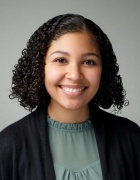
Recipient: Maggie Azu
Maggie is completing her PhD in clinical psychology under the advisement of Dr. Jamie Ostrov, focusing on the development and prevention of aggression and peer victimization. Her GRFP proposal seeks to understand the role young children play in shaping the social and emotional development of their peers. Specifically, Maggie's project will examine how parents' responses to children's emotions predict how children then respond to their peers' emotions. The study will also consider the combined influence of parent and peer emotion socialization on preschoolers' aggressive behavior, social skills, and emotion regulation skills. Maggie received her undergraduate degree in psychology from Amherst College before she began her doctoral studies at UB.

Recipient: Sarah MacDougall
Sarah is completing her PhD in cognitive psychology at UB under the mentorship of Dr. Andrés Buxó-Lugo, focusing on language processing and cognition. Her GRFP proposal focuses on analyzing elements of prosody (i.e., patterns of stress and intonation in language). Sarah's work is specifically aimed at better understanding pitch and stress, in a way that would allow a time-synced investigation into facial expressions using electromagnetic articulography in three languages (English, Japanese, and Akan Twi). Additionally, she has started to explore language innovation and propagation through various political pipelines. A former music major, Sarah took a winding path and eventually got her undergraduate degree in psychology from Purdue University before pursuing graduate studies at UB.
Lagerspetz Award
In honor of Kirsti Lagerspetz, co-founder of the International Society for Research on Aggression (ISRA), the Lagerspetz Awards are given by the ISRA to junior scholars for excellence in presentation at the biennial world meeting. The 2025 meeting was held in Munich, Germany. Recipients receive a certificate and a $100 honorarium.
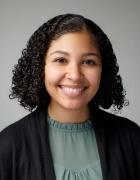
Honoree: Maggie Azu
Maggie won the award for her poster, "The Role of Basal Cortisol and Parental Warmth in Associations Between Peer Victimization and Later Aggression in Early Childhood." She examined how preschoolers’ HPA axis function (basal salivary cortisol) and parental warmth moderated the relation between peer victimization and later aggression. Findings revealed that relational victimization predicted later relational aggression, with high parental warmth strengthening this link, and a trend suggesting cortisol and warmth may jointly influence the impact of physical victimization on later aggression. Maggie's advisor is Dr. Jamie Ostrov.

Honoree: Emalee Kerr
Emalee received the award for her poster, "Contexts of Sexual Assault Protective Behavior Strategies." Her study examined when women use sexual assault protective behavioral strategies (SA-PBS) across various high-risk contexts over four years and found that proactive SA-PBS use was more likely at bars or parties and when with friends or acquaintances. While proactive and reactive SA-PBS were generally used more in high-risk situations, notable exceptions suggest that tailoring prevention efforts to specific contexts could improve their effectiveness. Emalee is mentored by Dr. Jennifer Read.
SUNY Graduate Research Empowering and Accelerating Talent (GREAT) Award
The SUNY GREAT Award provides $7,500 in flexible funding from the SUNY Office of Research and Economic Development that students can use for research expenses, related travel, professional development and stipend augmentation.

Honoree: Verenice Ascencio Gutierrez
Using rodent models, Verenice's research investigates how maternal diet and early-life feeding exposures shape long-term taste and flavor preferences. Although its well established that prenatal and early postnatal exposures influence children's food preferences, her work explores whether these effects persist into adulthood. The findings aim to highlight how early feeding practices may have lasting impacts on eating behavior and health. Verenice is mentored by Dr. Ann-Marie Torregrossa.

Honoree: Sarah MacDougall
Sarah's scientific interests center on language perception, production, and propagation, and generally anything involving language and cognition. Her current research examines memory and semantic categorization, as well as investigations into how various linguistic features spread across communities. Central to Sarah's research is the fact that language is both a social act and a cognitive process, and she strives to account for those factors in her work. Her advisor is Dr. Andrés Buxó-Lugo.
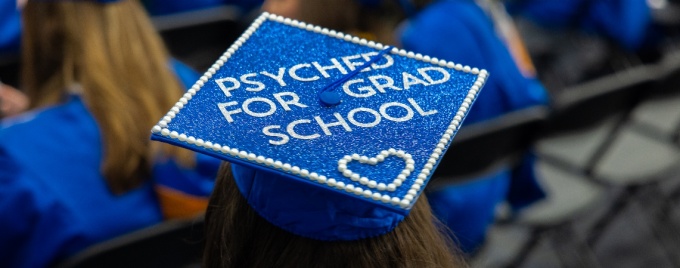
PAWNY Scholarship Award for Racial/Ethnic Minority Doctoral Candidates in Clinical & Counseling Psychology in WNY

Recipient: Emily Hong
The Psychological Association of Western New York (PAWNY) recognizes the importance of supporting and encouraging underrepresented racial and ethnic minority students to pursue and complete doctoral training in clinical and counseling psychology. To assist with this goal, a $1000 scholarship gift is awarded once annually to qualified applicants who are currently enrolled in a local WNY doctoral program in clinical or counseling psychology. Emily's advisor is Dr. Jamie Ostrov.
PAWNY Morton D. Brooks Scholarship Award
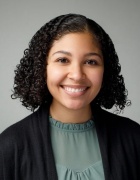
Recipient: Maggie Azu
Established by the late Morton D. Brooks (1926-2021), a clinical psychologist in WNY known for his specialty in school psychology, this award from the Psychological Association of Western New York (PAWNY) bestows $500 to a doctoral student or early career psychologist who has excelled in both academic and clinical areas and who has shown promise in making significant contributions to the field of psychology. Maggie, a doctoral student in our Clinical Psychology PhD program, is mentored by Dr. Jamie Ostrov.
The Bugelski Dissertation Award
The Bugelski Award recognizes outstanding doctoral scholarship in psychology. The award is named after former UB faculty member Dr. B. Richard Bugelski, an expert in learning and memory who was a member of UB's Psychology Department for over 30 years (1946-1978). Established by his student Dr. Donahue Tremaine, the Bugelski award is given based on excellence in scholarly productivity during doctoral studies, and significance and quality of the doctoral dissertation project.

Honoree: Ashmita Mukherjee
Ashmita received this award for her dissertation research on the orexin system and its role in enhancing the hedonic (i.e., pleasurable) effects of the opioid hydrocodone, and effecting nicotine’s ability to reduce sensitivity to the unfavorable properties of opioid use. In addition to the honor, Ashmita will receive a monetary award of $2500. She is mentored by Dr. Greg Loney.
Runners-up: Bobby Cooper (mentored by Dr. Larry Hawk), Chihiro Honda (mentored by Dr. Peter Pfordresher), and Aria Wiseblatt (mentored by Dr. Jennifer Read) each received a monetary award of $1000.
The Robert W. Rice Memorial Award
The Rice Award honors early excellence in scientific research for an empirical paper completed by a graduate student during the first three years of graduate training. Robert W. Rice, an internationally recognized scholar in social-organizational psychology, joined UB in 1975. He was known for his prolific research on job satisfaction and work-family dynamics, as well as his dedication to teaching and mentorship. His legacy continues through the Robert W. Rice Memorial Award, established by a generous donation from his estate.

Honoree: Izilda Pereira-Jorge
Izilda received the award for her paper titled, “Marginalized and Advantaged Parents’ Perceptions of Identity-Safety Cues in K-12 Classrooms,” which is in press in Social Psychological and Personality Science. In this work, Black and LGBTQ+ parents perceived identity-relevant safety cues (Black Lives Matter or Pride posters) as more appropriate and as prompting more positive education-related outcomes (child belonging, classroom interest) than White, cisgender-heterosexual parents, who preferred control classrooms. This research reveals identity-based disparities in perceptions of educational inclusivity efforts in the context of current movements toward heightened parental control in education. In addition to the honor, Izilda will receive a cash award of $1,500, and will be recognized on our Robert W Rice Memorial Award Plaque. Her mentor is Dr. Kim Chaney.
Runners-up: Sydney David (mentored by Dr. Derek Daniels) and Nathaniel Perdue (mentored by Dr. Craig Colder), who will each receive a cash award of $250.
The Murray Levine Award for Community Engagement in Psychology
Dr. Murray Levine was a member of the UB Psychology Department from 1968 until 2000. He was a member of the clinical area and a SUNY Distinguished Service Professor. Dr. Levine was among a core group of influential psychologists who helped launch the field of community psychology. This award recognizes original research that is poised to make a significant impact on the community surrounding UB and is sponsored by the generous support of Dr. Robert Fink, a UB alumnus and one of Dr. Levine’s former students. Award recipients receive $500.

Graduate Honoree: Brittney Greene
Brittney, a student in the clinical doctoral program, received the Murray Levine Award for her research, which focused on using community engagement studios to gather feedback from community members to help shape assessments for a future study on cannabis use among cancer patients. This approach addressed mistrust toward researchers and successfully identified key content and formats to improve study relevance, particularly for marginalized populations. Brittney’s work highlights the value of community input in designing more impactful health psychology research. She is mentored by Dr. Rebecca Ashare.
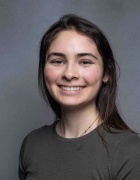
Undergraduate Honoree: Caramia Michno
Caramia received the Murray Levine Award for her dedicated service to the Psychology Department and UB community. She has been a member of Bridges International Buffalo and received the Benjamin A. Gilman International Scholarship to study in Costa Rica through the Institute for Central American Development Studies. Caramia interned with the Collegiate Science and Technology Entry Program, is a Ronald E. McNair Scholar, and served as a college ambassador for Psychology. She is also a UB Honors College member and completing an Honors Thesis under the mentorship of Dr. Shira Gabriel.
Graduate School Excellence in Teaching Awards for Graduate Teaching Assistants
Bestowed by UB's Graduate School and Graduate Student Association, the Excellence in Teaching Awards for Graduate Teaching Assistants recognize graduate students who demonstrate exceptional performance in the execution of teaching responsibilities, teaching competence, effective mentorship of students, and maintenance of high academic standards and expectations of student performance.

Honoree: Nikki Coleman
Nikki, a student in the cognitive psychology PhD program, has served as a teaching assistant for a wide range of challenging courses: Introductory Psychology, Psychological Statistics, Scientific Inquiry, Biopsychology, Developmental Psychology, and Advanced Research Methods. She has also independently taught both Cognitive Psychology and Memory. Her advisor is Dr. Peter Pfordresher.
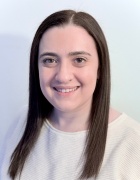
Honoree: Zoey Forrester-Fronstin
Zoey, a student in the behavioral neuroscience doctoral program, has served as a teaching assistant for some of the most demanding courses in the psychology curriculum, including Psychological Statistics, Biopsychology, and Advanced Research Methods. She has also independently taught an upper-level course in Hormones and Behavior. Zoey's advisor is Dr. Matthew Paul.
Undergraduate Awards
Psi Chi Regional Research Awards
Psi Chi, the International Honors Society in Psychology, recognizes undergraduate excellence in empirical research with the Regional Research Awards. The awards are intended to promote student authors' careers in psychology by conferring official recognition of scientific merit from Psi Chi and a $400 cash prize.

Honoree: Bridget Crandall
Bridget received a Psi Chi Regional Research Award for her research titled, “Acoustic Communication in a Mouse Model of Alzheimer's Disease,” which she presented at the Midwestern Psychological Association (MPA) annual conference in Chicago, IL. Bridget is a member of the Psychology Honors Program and is advised by Dr. Micheal Dent.

Honoree: Katie Kremer
Katie received a Psi Chi Regional Research Award for her research titled, “Associations Between COVID-19 Impact, Basal Cortisol, and Executive Function in Early Childhood,” which she presented at the Eastern Psychological Association (EPA) annual conference in New York, NY. Katie will be a member of the Psychology Honors Program next year and is mentored by Dr. Jamie Ostrov.
UB Excellence in Research, Scholarship & Creativity Award

Honoree: Lowell Santoro
UB's Excellence in Research, Scholarship & Creativity Award recognizes outstanding achievement in presentation, content, and scope, thus meriting university-wide distinction. Lowell won the award for his research project, "PTSD Symptoms and Problematic Alcohol Use: Role of Drinking Motivations," which he presented at the UB Celebration of Student Academic Excellence. This work--the focus of Lowell's Honors Thesis--centered on understanding the factors potentially driving the relation between PTSD and alcohol misuse. Lowell's mentor is Dr. Jennifer Read.
UB Dean’s Departmental Award for Outstanding Senior
This award honors the most outstanding graduating senior from each department in UB’s College of Arts and Sciences. We recognize the undergraduate who has best demonstrated the highest level of academic achievement and involvement in the Department of Psychology and the field of psychological science.

Honoree: Riley Godwin
Riley Godwin of Buffalo, NY, graduates summa cum laude with a 4.0 GPA, receiving a Bachelor of Arts in psychology and health and human services with a community mental health concentration. Riley is a member of both the University Honors College and Psychology Honors Program. She served as an Undergraduate Student Representative on both the Department of Psychology Senate and the Office of the Vice Provost for Undergraduate Education Academic Integrity Committee. Riley served as Vice President and Social Media Coordinator of the Undergraduate Psychology Association, completed a study abroad program in London, England, and worked as a school counseling intern at Persistence Preparatory Academy. She was an undergraduate researcher in Dr. Shira Gabriel's Social Self Laboratory, Dr. Federica Bulgarelli's Buffalo Early Learning Laboratory, and Dr. Jamie Ostrov's Social Development Laboratory. Under Dr. Ostrov's advisement, Riley conducted an independent Honors Thesis. In the fall, she will begin a doctoral degree program in school psychology at UB.
Psychology Honors Program
The Psychology Honors Program enables senior Psychology majors to complete an individual research project (i.e., Honors Thesis) under the supervision of a faculty advisor. Students work on completing their Honors Thesis throughout both the Fall and Spring semesters, then defend it in an oral examination at the end of Spring. This challenging yet highly rewarding experience involves all steps in the research process and prepares students for a wide variety of educational and career opportunities. The Honors Program Director is Dr. Wendy Quinton.
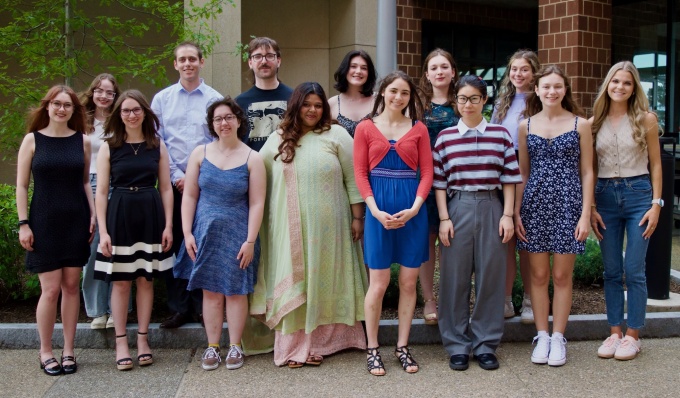
Back row: Bridget Crandall, Lowell Santoro, Matthew Proy, Katy Szynkowski, Noor Maher Al-Khaouli, Mirelis Silva
Front row: Alexis Dimitroff, Samantha Syracuse, Kathryn Trumble, Manaal Azad, Caramia Michno, Xinluan Dong, Giulianna Roth, Riley Godwin
2024-2025 Psychology Honors Students
| Student | Advisor | Thesis Title |
Noor Maher Al-Khaouli | Dr. Hollen Reischer | Exploring Diverse Adults' Expectations of End-of-Life Care and Perspectives on Artificial Intelligence Integration in Advance Care Planning |
Manaal Azad | Dr. Rebecca Ashare | The Intersection of Cannabis Use and HIV on Inflammation and Cognitive Function |
Erim Buyuk | Dr. Jennifer Read | Interpersonal Trauma and Co-use: Trauma’s Relationship with Substance Use and Disconstraint |
Bridget Crandall | Dr. Micheal Dent | Acoustic Communication in a Mouse Model of Alzheimer’s Disease |
Alexis Dimitroff | Dr. Larry Hawk & Dr. Len Simms | Assessing Individual Differences in Emotional Imagery Ability: A Psychometric Evaluation of The Plymouth Sensory Imagery Questionnaire |
Xinluan Dong | Dr. Ralph Benedict | Optimizing the Detection of Anosognosia in Mild Cognitive Impairment and Alzheimer’s Disease |
Riley Godwin | Dr. Jamie Ostrov | The Role of Household Chaos on Depressive Symptoms and Aggressive Behavior During the Pre-K to Kindergarten Transition |
Caramia Michno | Dr. Shira Gabriel | Creating a New “We”: Collective Experiences and University Belongingness |
Matthew Proy | Dr. Andrés Buxó-Lugo | The Sentences Are Not What They Seem: The Problem of Prosody for the Garden-Path Linger |
Giulianna Roth | Dr. Mark Seery | Understanding Witnesses’ Reactions: Traditional Gender Roles and Sexual Harassment |
Lowell Santoro | Dr. Jennifer Read | Post-Traumatic Stress Disorder Symptom Clusters, Problem Drinking, and the Mediating Role of Drinking Motivations |
Riddhi Shelat | Dr. Shira Gabriel | I Faked It and Made It. What Now? Influence of Job Interview Behaviors and Outcomes |
Mirelis Silva | Dr. Rebecca Schwartz-Mette | The Impact of COVID-19 Isolation on Adolescents’ Emotion Regulation and Suicide Risk |
Samantha Syracuse | Dr. Mark Seery | Self-Distancing as a Buffer of the Effects of Cognitive Dissonance |
Katy Szynkowski | Dr. Kathleen Parks | Simultaneous Alcohol and Marijuana Use Among College Students: Associations With Experiencing Negative Sexual Consequences |
Kathryn Trumble | Dr. Larry Hawk | Does Problematic Alcohol Use Predict Success in Abstaining From Nicotine Use for One Day Among Adults Who Smoke or Vape? |
The Marvin Feldman and Walter Cohen Award

Honoree: Bridget Crandall
The Feldman-Cohen Award recognizes the most exceptional undergraduate Psychology Honors Thesis. Named in honor of two of the Department’s most distinguished former faculty, the award goes to the undergraduate whose Honors Thesis receives the highest ranking by the student’s examination committee and faculty advisor.
Bridget's Thesis, supervised by Dr. Micheal Dent, investigated communication deficits and Alzheimer’s disease using the 3xTg-AD Alzheimer's mouse model. Results revealed an age-related progression of hearing loss, which was more exaggerated in male mice and 3xTg-AD mice. In addition, there was a decrease in the number of calls produced and the type of calls produced by 3xTg-AD mice compared to controls. These findings reflect a similar progression of cognitive deficits seen in humans with Alzheimer’s, where hearing loss is observed first and altered speech patterns are observed later. Further, the 3xTg-AD mouse model is cognitively similar to humans with Alzheimer’s and may be used for future research on cognitive and social deficits in Alzheimer’s disease. Along with the honor, Bridget will receive a monetary award of $750.
Runner-up: Lowell Santoro
Lowell's project, supervised by Dr. Jennifer Read, examined the factors potentially driving the relation between PTSD and alcohol misuse. As the runner-up, he will receive a monetary award of $250.
Psi Chi, The International Honor Society in Psychology

Psi Chi was founded in 1929 to encourage, stimulate and maintain excellence in scholarship and advance the science of psychology. Membership in Psi Chi is an earned lifetime honor. UB's Psi Chi chapter is student run and advised by Dr. Joyce Lacy. Our Psi Chi officers and members work closely with officers from our Undergraduate Psychology Association (UPA) on fun and enriching activities for psychology undergraduates (e.g., guest speakers, informational sessions on careers and graduate school, social events, and volunteer activities).
Psi Chi Graduating Officers
- President: Alexis Dimitroff
- Vice President: Lowell Santoro
- Secretary: Trishani Sudanandan
UPA Graduating Officers
- President: Taylor Adams
- Vice President: Riley Godwin
- Secretary: Loise Allen Pador
- Treasurer: Abdullah Alam
- Social Media Coordinator: Kaylee Demkovich
Psi Chi Graduating Seniors
- Taylor Adams
- Abdullah Alam
- Noor Maher Al-Khaouli
- Saviour Danquah Ameyaa
- Manaal Azad
- Matthew Robert Baker
- Katie Banas
- Megan Barwald
- Isabella Rose Boswell
- Erim Hamdi Buyuk
- Rachel Coley
- Bridget Crandall
- Shea Woods Cutichio
- Marilisse R Diaz
- Alexis Page Dimitroff
- Xinluan Dong
- Gabrielle Gelinas
- Riley Godwin
- Crystal Kimberly Hong
- Emma Hurtgam
- Sophia Graham Izzo
- Julian Dominic Livingston
- Samantha Mandel
- . Marjan
- Gabriella Markham
- Dawn Mccarthy
- Kayla Suzanne Miller
- Mo Ka Ng
- Richard Nicosia
- Ardina Osmani
- Rhonda A Persons
- Rowan Isaac Radel
- Giulianna Roth
- Lowell Santoro
- Mirelis Silva
- Harbir Singh
- Tristan Charles Spotts
- Trishani Sudanandan
- Emily Sweeney
- Samantha Elizabeth Syracuse
- Kathryn Trumble
- Angelina Valentino
- Rachel Y Wang
- Stella O'Dell Zang
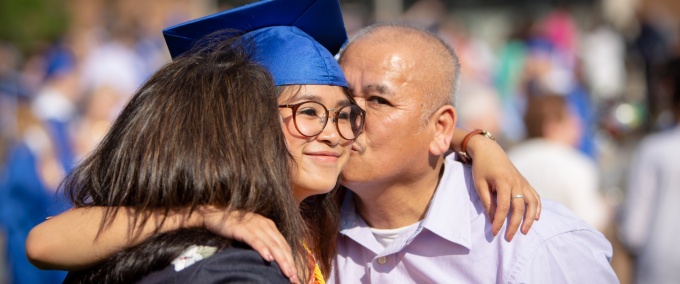
Faculty Awards and Promotions
SUNY DISTINGUISHED PROFESSORSHIP
The SUNY Distinguished Professorship constitutes a promotion to the State University of New York’s highest academic rank. This honor is conferred by the Board of Trustees on faculty who have achieved national or international prominence and a distinguished reputation within their chosen field through significant contributions to research and scholarship. Appointees are inducted into the SUNY Distinguished Academy.

Dr. Jennifer Read
Dr. Jennifer Read was named a 2025 SUNY Distinguished Professor. Dr. Read’s seminal scholarship has demonstrated an internationally visible and impactful program of research that has elevated the field of addiction science and added to the intellectual environment of the Department of Psychology at UB. Dr. Read is a world-renowned authority on the causes and consequences of problematic substance use, with a specific focus on the intersection of trauma and substance use. Her rigorous work includes longitudinal designs, laboratory studies, intervention work, and advanced quantitative methods. Collectively Dr. Read’s program of research has received continuous support during her 22+ years at UB, including Principal Investigator or Co-Investigator on 10 federal grants totaling over $17 million. She has published over 160 peer-reviewed articles, a book, 8 book chapters, and numerous invited talks and conference presentations. With an h-index of 61 (over 18,550 citations), her publications have appeared in the most prestigious journals in the field of psychology. She is a fellow of the Association for Psychological Science and the Association for the Advancement of Behavior and Cognitive Therapy (ABCT). Dr. Read was a 2023 recipient of the SUNY Chancellor’s Award for Excellence in Scholarship and Creative Activities and received the 2017 Outstanding Individual Contributions to Research Award from ABCT. She has been chair of a NIH review panel, serves on the board of directors for the Research Society on Alcohol, and is the current editor-in-chief of the Journal of Studies on Alcohol and Drugs. Dr. Read has received recognition for her mentorship, is the former Director of Clinical Training and Clinical Area Head, and is the current Chair of the UB Department of Psychology.
Society for Personality Assessment Mid-Career Scholar Award

Honoree: Dr. Leonard Simms
The Society for Personality Assessment Mid-Career Scholar Award recognizes outstanding contributions to the field of personality assessment by scholars 15–25 years beyond their doctoral degree. Dr. Simms's research centers on the measurement of personality and psychopathology, particularly the structure and phenotypic description of personality pathology. He also conducts applied psychometric research to develop and refine assessment tools, with an emphasis on translating these findings into clinically useful applications.
Association for Psychological Science Rising Star Award
The Association for Psychologcal Science (APS) Rising Star distinction is bestowed on exceptional scientists who are in the early stages of their research careers. The Rising Star designation honors researchers whose groundbreaking work has already made a significant impact in their field and highlights their strong potential for future contributions.

Federica Bulgarelli
Dr. Bulgarelli was named an APS Rising Star in 2025. Her research focuses on how learners—particularly infants and young children—process and learn from the highly variable linguistic input they encounter. Dr. Bulgarelli's work examines how factors such as talker differences, accents, and language background influence early word learning. Through this work, she aims to understand how variability in everyday language input shapes both the process and outcomes of learning.
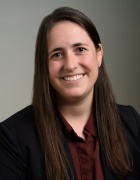
Kim Chaney
Named an APS Rising Star in 2024, Dr. Chaney's research examines how: (1) lay beliefs about prejudice affect marginalized and privileged group members’ performance, behavior, and health, (2) how and when prejudice confrontations reduce prejudice and impact the health of confronters, and (3) how individual and organizational claims of allyship are perceived. Dr. Chaney utilizes multiple methodologies to examine core questions about how people perceive, experience, and combat prejudice in their day-to-day lives.
Association of Psychology Training Clinics Innovation Award

Sarah Taber-Thomas
The Association of Psychology Training Clinics Innovation Award (Social Justice) honors training clinics that create and sustain a meaningful impact on the services provided in the communities they serve. Dr. Sarah Taber-Thomas has directed UB's clinic, the Psychological Services Center (PSC), since 2015. She and the clinic received the award for their work within the Community-Based Participatory Research framework, which included establishing a Community Advisory Board and pursuing a collaboration with the National Witness Project to develop an outreach program focused on mental health in Buffalo's Black community. The award includes a $500 grant to UB's training clinic to further the PSC's innovative work.
University of Minnesota Distinguished Alumni Award

Jamie Ostrov
Recipients of the University of Minnesota's College of Education and Human Development Distinguished Alumni Award are community builders and leaders who make a positive difference in the lives of children, youth, families, schools, and organizations. Dr. Ostrov, a 2024 honoree, earned his PhD in child psychology at the University of Minnesota in 2004. A member of our Clinical Psychology area and the Director of Clinical Training, Dr. Ostrov's research centers on social development with a developmental psychopathology orientation. Specifically, his work focuses on understanding the development of subtypes of aggressive behavior in children and investigating potential interventions.
UB Research and Economic Development Award

Ann-Marie Torregrossa
The UB Research and Economic Development Award provides funding for equipment that can have a potentially transformative impact. Dr. Torregrossa, a behavioral neuroscientist and expert in the study of ingestive behavior, received the award to enable the acquisition of an 8-unit metabolic quantification system for animal models to measure: (1) indirect calorimetry (i.e., metabolic rate), (2) food and fluid monitoring, and (3) locomotion and wheel running. Data from this instrument can be groundbreaking in understanding ingestive processes, as access to this type of equipment is limited at most universities.
UB Academic Integrity Award

Honoree: Kimberly Beede-James
UB's Office of Academic Integrity honors individuals who exemplify and promote academic integrity--the core value of all teaching, learning, and research--with Academic Integrity Awards. Based on departmental nominations, the award recognizes those who have gone above and beyond in fostering a culture of integrity at UB, and thus serve as models in upholding the value of academic integrity. A 2025 awardee, Dr. Beede-James teaches UB Seminar, Biopsychology, Health Psychology, Sensory Processes and Perception, and Industrial Organizational Psychology.
Promotions

Dr. Lora Park
Dr. Park was promoted to Professor in 2024. A social psychologist and member of our Social-Personality area, her work focuses broadly on questions pertaining to the self, motivation, well-being, and interpersonal processes. Dr. Park's work has advanced our understanding of how people’s experience of themselves affects motivation, well-being, and relationships. It has also identified interventions to improve important societal outcomes (e.g. broadening participation of underrepresented groups in STEM).
Department of Psychology Excellence in Teaching Awards
The Excellence in Teaching Awards celebrate outstanding instruction in psychological science. We recognize those instructors whose quantitative and qualitative teaching evaluations reflect the exceptional teaching achievement in the Department of Psychology.

Honoree (Ladder Faculty): Dr. Julie Bowker
Dr. Bowker, a developmental psychologist affiliated with our clinical psychology area, regularly teaches an undergraduate course in Adolescent Development and graduate courses in Advanced Developmental Psychology and Teaching College Psychology. Students highlight Dr. Bowker's passion, stating that she, "always checked in with [us], always reminded us of assignments, was willing to talk about issues, believed in us, pushed our thinking." They also noted the care she showed and that she "is very clear in presenting the material and how she is going to grade it," and that, "I think more people should teach like her." One student in Dr. Bowker's Adolescent Development course shared, "I hate reading, but I enjoyed reading all the books and felt I got something out of this course. I would 100% take [it] again."

Honoree (Clinical/Teaching Faculty or Adjunct): Dr. Christina Perazio
Dr. Perazio, who specializes in various facets of animal behavior (e.g., communication, cognition) from a cross-species perspective, regularly teaches UB Seminar, Scientific Inquiry, Sensory Processes and Perception, and Animal Behavior, all at the undergraduate level. Students note Dr. Perazio's clarity, organization, and how her assignments "made me look at the material in another way (which I enjoyed)." Further, "she was clearly very enthusiastic, and I liked when she would include a slide or two of information that we wouldn’t be tested on, but that she just thought was neat or interesting (she was usually, if not always, right!)." Lastly, "I am so grateful to have had the brilliant Dr. Perazio for this course."

Honoree (Graduate Student Instructor): Nicole Koefler
Nicole is a student in the social-personality doctoral program under the advisement of Dr. Lora Park. She has taught an undergraduate course in Social Psychology. Students consistently praised Nicole for her engaging teaching style, clear communication, and effective use of diverse materials. One student noted, "This was my favorite course this semester. Love that we watch[ed] videos from pop culture and tie[d] it into our lessons." Another highlighted Nicole's responsiveness: "Always answered questions and expanded with examples. Her classes were very enjoyable." Finally, "I loved having her as a professor and hope we continue to cross paths in social psychology!"
We are also incredibly proud of our faculty who have received recognition in the form of elected office, journal editorship, fellowship in professional societies, and other honors!